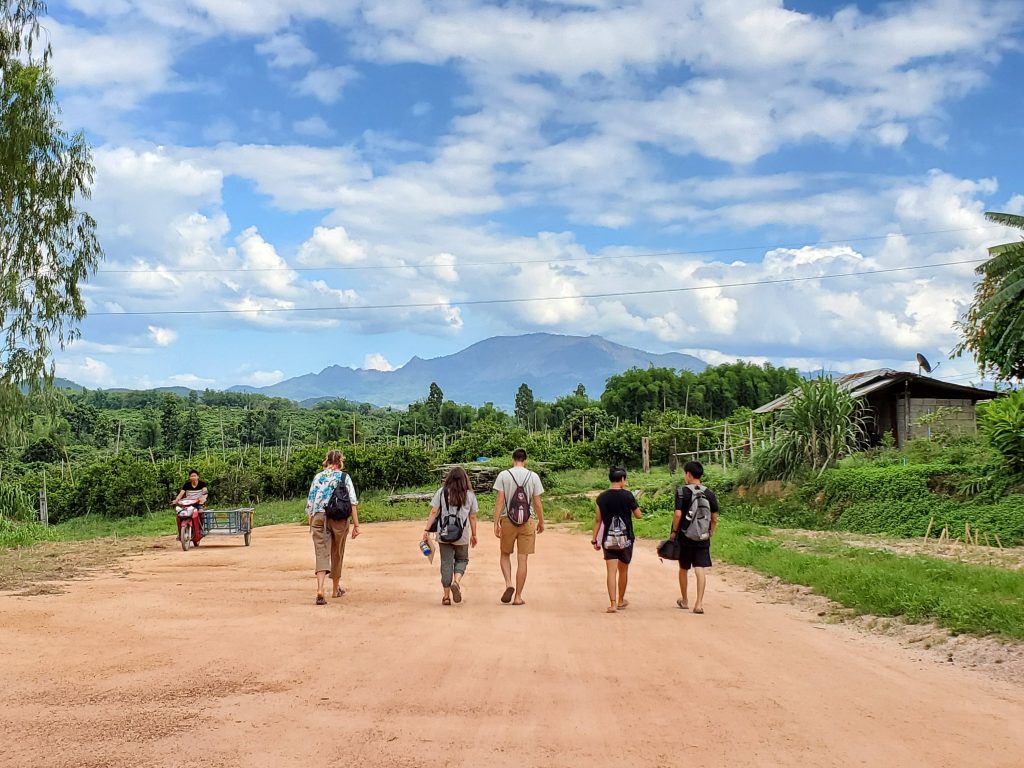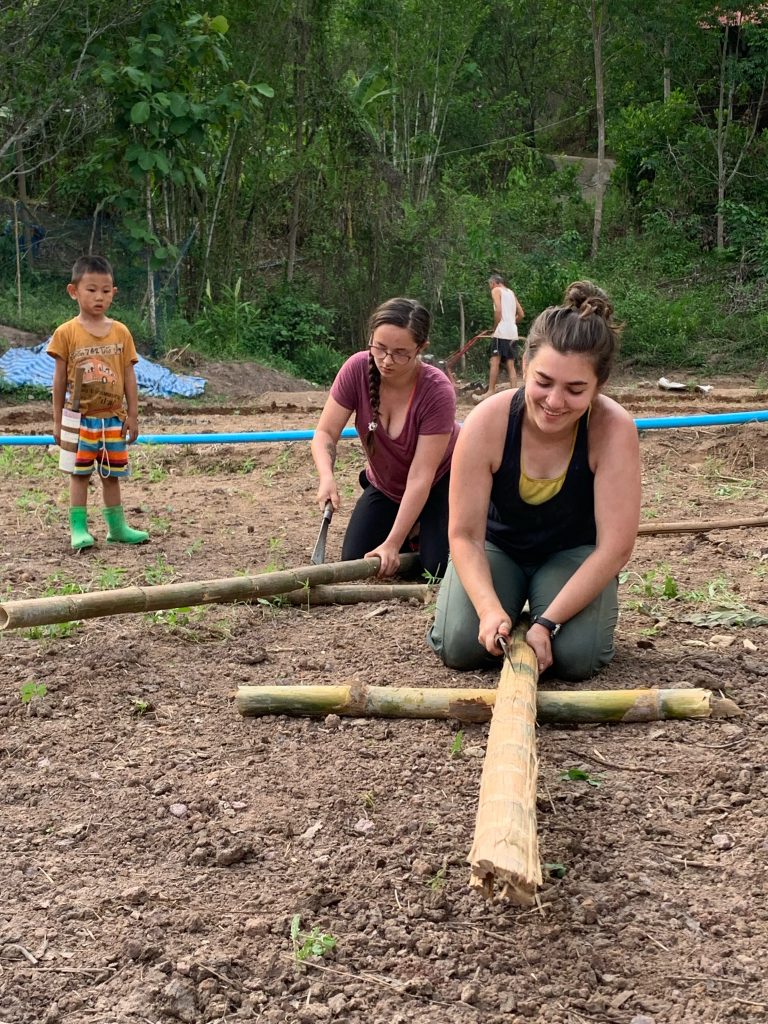
Mikaela Papageorgiou, senior non-profit leadership and communication double major, has wanted to use her journey grant to visit Thailand for a while now.
“It had been a dream of mine to go to Thailand ever since freshman year of college, just learning more and more about it and the different nonprofits that were over there, so I really wanted to go there for my journey grant,” Papageorgiou told the Hilltop Monitor
This summer, she got the chance to make that dream a reality.
As a non-profit major, Papageorgiou wanted to not only serve non-profits, but to make sure that she was doing so in a sustainable way.
“I started researching programs and programs that seemed to be healthy for the economies that weren’t just like white savior, volunteerism kind of companies,” said Papageorgiou.
Papageorgiou settled on Operation Groundswell, a Canadian non-profit focused on ethical backpacking. After an application and interview process – plus the process of getting her journey grant approved – Papageorgiou was ready to set out on her two- month Thailand adventure.
While in Thailand, Papageorgiou worked with four different non-profits related to organic farming.
“I worked with a French architect who was creating green space in Bangkok, and he’s making living structures out of fig trees, he’s like trying to do that as a demo, like no one’s ever done it before,” said Papageorgiou.
Other non-profits she worked with included an organic permaculture farm focused on sustainability and the Mirror Foundation, where she planted rice patties.
The Hilltop Monitor asked Papageorgiou what she saw as the benefits of studying non-profit leadership at William Jewell College.
“I’m already seeing the benefits of having a basic structure of knowing the inner workings of a non profit can set you apart in the field from the get-go,” said Papageorgiou.
Papageorgiou mentioned that one non-profit leader did not know the nonprofit’s mission statement, which she considers to be extremely important when working with vulnerable populations. The non-profit training that Jewell offers can help graduates be better equipped to help these populations right out of school.
Papageorgiou considers human connection to be one of the most rewarding aspects of travel. She encourages travelers and volunteers to talk to the people that they meet and try to learn from them in order to have the best possible experience.
She learned not to assume that she wouldn’t have anything in common with new people. Even when the people she was volunteering with didn’t speak English, Papageorgiou found ways to connect.
“A group of people didn’t speak any English, but we were all listening to Spotify together and they loved The 1975, so we bonded over that,” said Papageorgiou.
Papageorgiou’s trip to Thailand was not without challenges. At one non-profit, she ended up teaching kids of a wide variety of ages and learning levels who did not speak English.
“The teachers didn’t speak any English either and we also didn’t want to step on the teachers’ toes by thinking we knew more than the teachers,” said Papageorgiou. “That was one of the hardest things I think I’ve ever done, because I wanted to make sure everything was being done ethically.”
Ethical travel is extremely important to Papageorgiou.
It’s hard, because I love traveling, but I feel like the more I travel the more I’m seeing the impact it has on the environment,” said Papageorgiou. “ I know with planes, they have a huge carbon effect, but that being said I think when you travel you make the world feel smaller and smaller which is great, like people can learn from each other and a lot of hope can be spread.”

Operation Groundswell is very conscious about combating the negative environmental impact of travel.
“For each volunteer they send somewhere, they plant the amount of trees that will offset their travel,” said Papageorigou. “We walked a lot and tried not to rent cars, we tried to bike just so we weren’t adding to the emissions in Thailand, but it was kind of inevitable at certain points.”
The volunteers also brought their own reusable shopping bags.
“It’s a very plastic-heavy country, as is the US, but with food and vendors they often triple bag things so we would just make sure to bring our own bags,” said Papageorigou.
She also learned some sustainability tips from the farmers she worked with.
“You used everything, like I didn’t know you could use the outside of the garlic cloves that you usually crack into and then throw away,” said Papageorgiou. “You can cook with that, you can use every single piece of vegetables, which was really cool.”
Papageorgiou tried banana flowers, which are used as a meat alternative. She said they were delicious. In fact, the food was one of her favorite aspects of her trip.
“Food, food there is so amazing. I had Michelin star food from a stall,” said Papageorgiou. “And the food is for the people, it’s not like an elitist kind of thing, so that was just wonderful.”
She also notes safety as one of her favorite things about Thailand.
“I felt safer in Thailand than I do in the United States. I never once was catcalled or anything in Thailand walking the streets in Bangkok by myself,” said Papageorigou. “Which I was shocked [by], because everyone had said the opposite was going to happen, so that was cool. It made me feel empowered to travel alone as a woman.”
Papageorgiou does love to travel, but she grapples with the environmental impacts as she strives to live more sustainably.
“The program there had us write down every resource we used in our day-to-day lives to see how many Earths we would need, and I needed 6 and a half earths, and I was one of the lower amounts,” said Papageorgiou. “The farm we were on, the family, needed 1½ Earths because they fly twice a year, and that’s why they needed that extra ½ Earth. But other than that, they don’t have electricity, they don’t have fridges, they don’t have washing machines or anything, and they only needed one Earth.”
The family’s carbon footprint was so small because they do not use electricity. She thinks we all need to work to live more like the families she met during her trip.
“It just goes to show how much we need to dial back on what we’re doing,” said Papageorgiou. “We all need to do our part in making things better, because they are doing so much.”
However, she says the family does not think everyone needs to give up electricity. There are things we can all do to make our lifestyles more sustainable.
“They were so adamant that everyone can do their part. They were like even though we live this way, we aren’t doing anything better than you guys are,” Papageorgiou said. “We can still do just as much in our own lives.”
